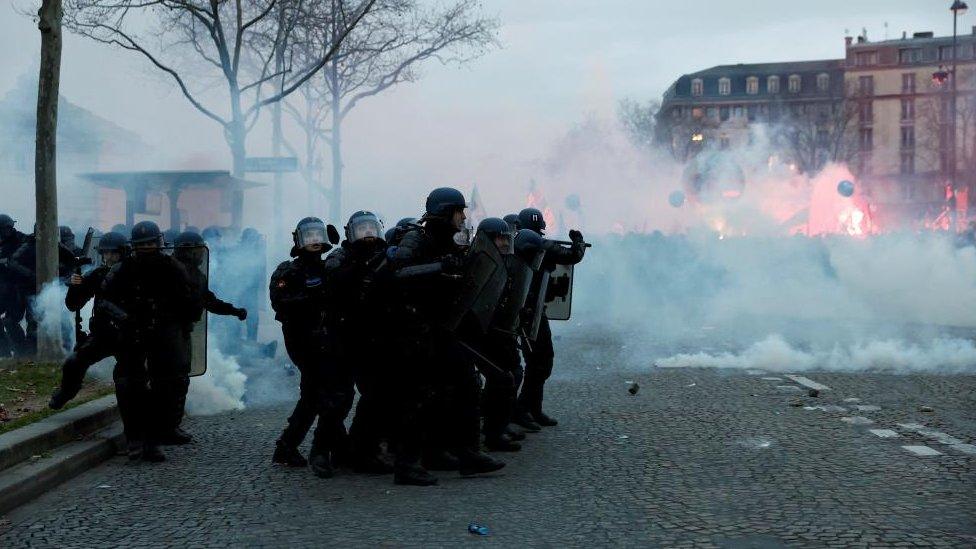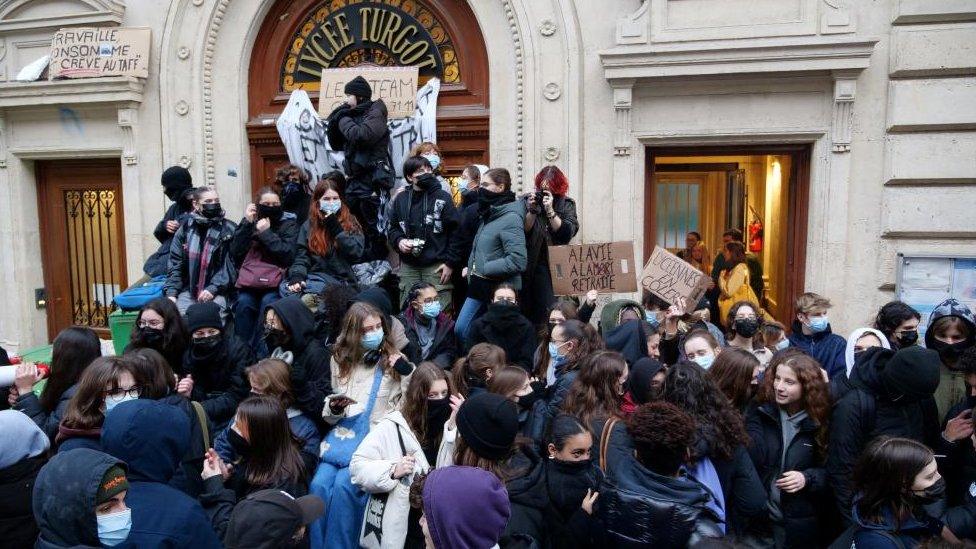French protests intensify against pension age rise
- Published
Watch: Protests take place across France over pension age rise
France has seen a second wave of protests and strikes against President Emmanuel Macron's plans to raise the retirement age from 62 to 64.
Anti-government corteges were as loud and as big, if not louder and bigger than on the first day of action.
The interior ministry said more than 1.27 million people protested, a higher figure than 12 days ago.
Eight key unions took part in the strike, which disrupted schools, public transport and oil refineries.
The CGT trade union said half a million protesters had gathered in Paris alone, although authorities put the number at 87,000, and the union put the total number across France as high as 2.8 million.
But for all the mass mobilisation, it is still far from clear if the protesters can force Mr Macron to back down. The government can withstand any number of "days of action" like this so long as they take place along the predictable and orderly lines that they have so far.
Mr Macron's government is pushing ahead with its pension age reforms in the face of opinion polls that suggest two-thirds of voters are opposed to the changes, which begin their passage through the National Assembly next week.
Without a majority in parliament, the government will have to rely on the right-wing Republicans for support as much as the ruling parties' own MPs.
Hours before the main protest began in the Place d'Italie in central Paris, thousands of marchers turned out in Toulouse, Marseille and Nice in the south, and Saint Nazaire, Nantes and Rennes in the west.

Police fired tear gas as tensions intensified at the end of the route in Place Vauban
A reported 11,000 police were deployed to cover the demonstrations taking place in more than 200 towns and cities. Some skirmishes were reported at the end of the Paris route in Place Vauban and 30 people were arrested. The interior minister praised police for their handling of the protests.
"Mr Macron is certain to lose," far-left leader Jean-Luc Mélenchon told reporters in Marseille. "Nobody wants his reforms, and the more the days go by, the greater the opposition to them."
Karima, 62, held up a placard in Paris highlighting that the government's plans hurt women far more than men: "Lots of us already have broken careers and will have to work even longer than men in order to have a full pension."

Karima (L) said she would have to work at least two more years to get a full pension
There was severe disruption to transport, with three-quarters of trains outside Paris cancelled and only two driverless metro lines operating normally in Paris. Large crowds were reported on one of the main overground lines in the capital.
Transport strikes no longer have the capacity to throttle France like they used to. The proportion of public sector workers on strike was actually lower on Tuesday than on 19 January - a sign, presumably, of a fear of lost wages.
The CGT union said at least three-quarters of workers had walked out at the big TotalEnergies oil refineries and fuel depots, although the company said the number was far lower. Power plants reported reduced production after workers went on strike at the main electricity company EDF.
One of the main teachers' unions said some 55% of secondary school teachers had walked out, although the government said the figure was just over a quarter. High school pupils staged protests outside some schools and students said they would occupy Sciences Po university in Paris in support of the strikers.
"A lot of French people feel that working is more and more painful. It's not that they don't want to work, they don't want to work in these conditions," Sciences Po political scientist Bruno Palier told the BBC.
There was also evidence that while raising the state pension age was a unifying call to arms, people were turning out for wider reasons, too.
A male nurse said he was there because conditions in public hospitals had become intolerable. Teachers are angry at the state of schools. Mr Macron the bogeyman was pilloried in cartoon and effigy.

High school students took part in the protests on Tuesday in support of the strikers
For the president and for Prime Minister Elisabeth Borne, that is a good argument for sticking to their guns: letting the people work off their anger, which is really just an expression of their powerlessness in the face of remorseless and incomprehensible change.
At 62, France's retirement age is lower than most other countries in Western Europe. Italy, Germany and Spain have moved towards raising the official retirement age to 67, while in the UK it is 66.
Mr Macron's government has indicated it may move some way on the detail of its reform but has refused to give in on the main thrust of the raising the retirement age by two years to 64.
"Any kind of reform that is going to ask people to work longer will be unpopular, but we've been elected on this reform," said Christopher Weissberg, an MP in Mr Macron's Renaissance party.
In France, very few workers have personal pensions linked to capital investments, but there are now only 1.7 workers paying into the shared pension fund per person in retirement.
"We have a universal system, and the system has to pay for itself. If not, it's weakening and if it's weakening, at some point, people will lose their pension," Mr Weissberg warned.
Economist Prof Philippe Aghion said the reforms were necessary because France had a structural deficit of some €13bn ($14bn; £11bn) and raising the retirement age would also help increase the rate of employment in France.
"That will give the government credibility to make some investments that it needs to make in schooling, in the hospital system that it needs to improve, and more investment in innovation and green industrialisation," he told BBC News.
France's opposition, fearing they will end up winning all the battles but not the war, may decide to escalate the dispute, so watch out for open-ended strikes at fuel depots, for example, or targeted power cuts.
So far the protests have been good-humoured and generally peaceful. As long as that remains the case, the government can ride out the opposition movement and see its bill quickly through parliament.
But if the economy starts hurting, things change. And if the protests turn violent, things change too.
Additional reporting by Aurore Laborie in Paris.
Related topics
- Published19 January 2023

- Published11 January 2023
